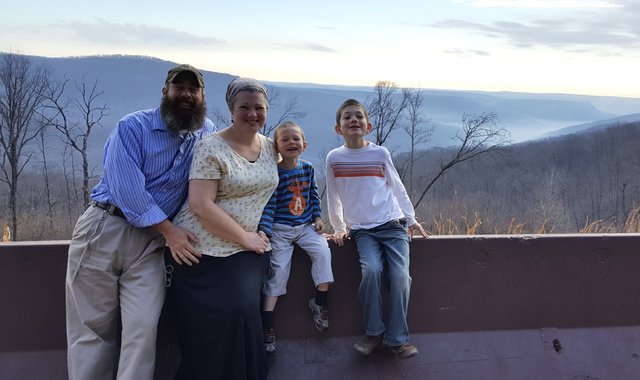Avoid Homestead Culture Shock - IT'S REAL!

Have you ever experienced culture shock? It usually is something that comes up when you move to a different part of the country or even a different country altogether and take in all of the changes in tradition and living.
The Google definition of "Culture Shock" is as follows:
the feeling of disorientation experienced by someone who is suddenly subjected to an unfamiliar culture, way of life, or set of attitudes.

We left the big city suburbs in the fall of 2012. We left behind the ability to eat out anytime we wanted, take hot showers on demand, flip on a light switch and so many other conveniences that people there are used to. It's been going on 6 years now and left many of the simple things that people take for granted, we have built now for ourselves. Things like electricity or indoor plumbing or even home wireless internet. I'm currently writing this post from charged AGM batteries with both the laptop and router being powered by the sun.
But almost 5 and a half years ago, we started from scratch living out of a 25 foot trailer with zero knowledge of solar or well pumps to bring water indoors. It's been a learning process and it hasn't been very easy.
But we had a set of solid goals in mind to reach and we knew we would try very hard to reach them. Some days were easier than others and some days were down right almost impossible.

The whole point of this post is to be an encouragement so that if you ever decide to begin this journey, know upfront that it won't be easy. But the rewards will be tremendous and the sense of satisfaction of self accomplishment will compare to nothing on earth. The world around us is designed to keep us dependent upon it. So if you can break free, it will literally be like a prisoner who walks out of prison after a (whatever your age is) year sentence.
Having lived off grid now for approaching 6 years, we have talked to many families and have seen people attempt the homesteading life. They have a desire to grow a large garden, have some chickens and maybe goats or sheep and preserve some of their food in a sustainable way. I think we have seen maybe a 50/50 success rate among families.
The biggest issue it seems is the culture shock. Especially if there are teens or pre-teen children involved. The most success comes from families with small children or with grown children or no children at all. If you take a family that is used to eating out at restaurants all week, ordering take out, participating in or attending sporting events, mall shopping, etc, then move to a place where you have to drive 30 minutes or longer before you see any of those things, it will be rough.

For a family, that can be a culture shock. That may seem simple as an example but I can tell you from experience of talking to others that this is a real issue.
HOW TO AVOID HOMESTEAD CULTURE SHOCK
It's almost impossible to avoid all forms of culture shock when moving to a rural homestead whether you are off grid or not. But you can lesson the impact a couple of ways.
Set Expectations - You family needs to know what they are getting into. If you have teens especially, they need to be gung ho and just as much on board as you are. They need to see that they too are getting a benefit out of all this. Whether that be inherited debt free land one day or something else. It goes without saying that your spouse better be fully on board. I've talked to many guys who assure me that their wife is on board only to find out later the husband was lying to himself. Both spouses need to be 100% rock solid behind the idea with a "burn the boats" mentality going forward.
Start Cooking - This is a huge deal. It seems so simple but really this is major issue when a family moves off grid. No longer is it easy to run to town to sit down at a restaurant or order a delivery of pizza or Chinese food.
Mom now with all her other responsibilities tries to take on the role of full time cook and that adds stress to her life. The kids don't like mom's cooking as really she has never done a lot of it before. And dad is just trying to keep the peace. The solution: start cooking and learning to cook long before you move to your new homestead. Wean yourself off processed foods.
Like the cigarette companies, the food industry learned something of great value years ago when it was found out that adding chemicals to processed foods will keep the consumer addicted and coming back for more. The cigarette companies were found to be doing this and held accountable in court. It wasn't just the nicotine from the tobacco that made you addicted to the cigarettes, it was the combination of other added chemicals that increased the effect of the nicotine that made you keep coming back for more and more. The food industry is still doing this today and when you remove yourself from the highly processed and chemically laden foods, your body stresses over it because it's going through a withdrawal. It's given a new meaning to "comfort food".
By learning how to cook with natural ingredients before a move like this, you are greatly reducing the influence of processed foods in your body and believe me, this makes a difference. Convenience foods that are highly processed with all sorts of chemical additives will take its toll on a family who all of a sudden try to live in a rural setting where the closest eatery is 30-40 minutes away or farther.
- Activity Changes - If a family is used to participating in sporting events or attending hobby functions that you can only find in the metro area you used to live in, trying to stay active in these activities is going to produce further stress by trying to keep up with them over a long distance. We have seen family after family continue to try and stay involved in big city functions only to realize they miss them so much that they give up homesteading for them.
Example: A 12 year old child enjoys playing select baseball.

A solution would be to find things in the rural community to participate in. Kids have many activities like 4H. Many rural towns have lots of growing homeschool communities that have events. Adult women who are used to attending ladies functions have tea dates in our county where they can get together and discuss upcoming fair entries like quilts and such. The point is to find something local that interest you and be part of the community. This will help reduce the stress and you will learn from many others in your rural community and how they do things which will make life easier in the long run for you. Again, "Burn The Boats"
There were a number of factors working in our favor when it came to moving off grid and homesteading.
- Jaimie and her parents lived for over a decade in Papua New Guinea where resources were thin and they lived frugally. It was a lifestyle they were already familiar with.
- I enlisted in the ARMY Infantry after high school and it gave me the fortitude to deal with stress and work hard to overcome obstacles. Jaimie's dad served in the Air Force and had been deployed to Vietnam. Any veteran already has the experience of being moved from place to place and adapting to a new environment.
- Our kids were young and they adapted better than teens that have to adapt to new life changes.
- My wife and her mother were already experienced cooks and bakers when we left for the homestead. They had experience in taking raw ingredients and making wholesome tasty foods.
But I don't want you to think that moving off grid and to raw land to build a homestead was easy for us. It's been literally blood, sweat and lots of tears in some cases. The point is that all families will endure culture shock. If you can make it through to the other side, your family will be stronger than ever and you will establish a comradery that will be hard to match with all the distractions in the more urban areas.

I don't want this article to become too long but I also want you the reader to know that we want you to succeed! Life is stressful enough and not everyone has to be a homesteader. If you decide to take on this role, jump in with both feet and give it your all.
We are always willing to try and answer questions and help you if we can.
Now, get out there and burn the boats! I'll be out working on my garden today!

Visit Us Online: http://AnAmericanHomestead.com



Back in 1999, when I moved from the third populated city in the state to a village with a population of under 600- culture shock was an understatement. The closest grocery store was 45 minutes away and if you forgot an ingredient, you made do and it went in the list for the next visit another week. Never knew that before I moved but it did help me become more creative.
That is one thing I have noticed in all things. You make do with what you got. If the farmers around here have an equipment breakdown, they make do or fix it with what they have rather than run to town for a part. The lady we get our milk from, never left her homestead until she was 11 years old.
Great article. We too have have seen a lot of shifts since moving to our land. But to be honest, we have been roughing it a while, but now we get the chance to set up systems ourselves and take care of our future selves.
You've laid it out really well here. It's a big shift of realities from a city to rural homestead. I feel one great step my partner and I have taken is to spend years wwooffing and traveling and learning to live with less. Then the shock is lessened.
Carving out a raw piece of land is tough! kudos to your family for taking the plunge, happy to read of your experience.
Absolutely, living while traveling will really help learn to live with less. Many times it's the STUFF that keeps us locked down to where we are and we never get to challenge ourselves with new opportunities.
Well said. STUFF is heavy. We've been going on spring purge and project completion blitz! It's been so rewarding to give things away that don't bring joy and check off those items from old TO-DO lists.
Wow, that was a very inspiring and completely truthful post. :D Homesteading isn't for everyone and there is no shame in admitting if its not for you. Those of us crazy enough to do this do feel the blessings and the curses that come with being a homesteader, but I still don't think we'd ever want to go back to living in cities again. :D
God bless you and your family. :D Have an awesome day! :D
I wonder if the ability to pull up stakes and move easily, and adapt to whatever the local scene throws at you, is why there seem to be so many former military folks turning to the homesteading life? It was fairly easy for the Husband and I to be like "let's do this!"
nice post, thanks for sharing!
follow me @thunderland
Great post. I hope you don't mind but I shared a link on my facebook page. You've shared a lot of great information all in one post, answering questions that I often hear people ask.
I struggle with building community around us, and finding like minded people. We are the odd ducks even out here in the country. The one mistake that we made, was jumping in and buying our property before getting to know the community.
Awesome! Solar living is in my near future.
I face this dilemma often in my mind, I do aspire to live off-grid, or at least produce much of our food via a garden, perhaps a few chickens, a good size greenhouse with a vibrant aquaponics setup. Does success require 'burning the boat' or can I work into it by getting skills and testing my discipline to get these things working in my current suburban situation? For this planting season I hope I get a good harvest at least. Congratulations on your journey thus far, and thank you for sharing a realistic view, I wish you all the best.
Thanks for the very informative post. As we've recently become empty nesters, the idea of getting more self-sufficient has become one of our goals. I've grown very weary of working for someone else, just never had the juevos to make the leap to self employment. But now with all the ways possible to earn a living it just seems inevitable to begin the journey to self reliance. Thanks again for the inspiration, peace, JerryT
This is why (whenever we are able to get out of town) my family wants to start from the opposite end of the spectrum and work our way down. My wife and kids (preteens and teens, like you said) consider a comfortable house and indoor plumbing to be needs, so we'll start there and eventually try to incorporate ways to provide those luxuries for ourselves. We already cook most of our own meals and have always kept a small garden. We want to use that as a starting point and gradually (or not-so-gradually, if we're able to navigate the learning curve quickly enough) move closer to self-sustainability.
I will say that you guys have been a big inspiration. I first got interested in living more self-sufficiently from all of those Alaska shows on TV, so my initial research was kind of biased. Your YouTube channel was the first resource that I ran into that was happening close to home. In fact, I only learned about Steemit because I followed you over here. So, thanks for all that you do! Sorry for the long comment.